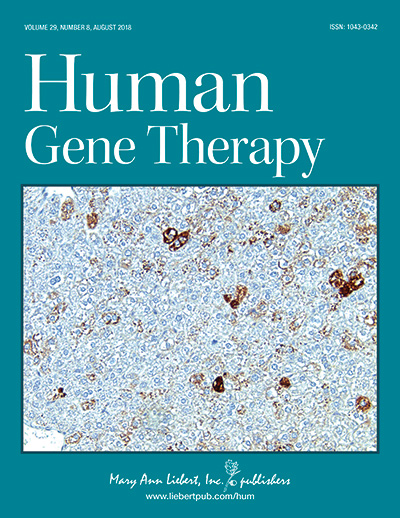For Immediate Release
Single Injection of Novel Gene Therapy Vector Prolonged Survival in Mouse Model of Pompe Disease
Contact: Kathryn Ryan
914-740-2250
kryan@liebertpub.com

New Rochelle, NY, August 13, 2018—A new study has shown that a single injection of a novel adeno-associated vector (AAV)-based therapy can result in improved enzyme activity and glycogen clearance as well as prolonged survival in a mouse model of Pompe disease. Young mice received an injection of AAVB1-GAA gene therapy, which delivers a normal copy of the gene for the lysosomal enzyme alpha glucosidase (GAA), which is mutated in Pompe disease, a lysosoma disease. The positive effects of gene replacement seen in adult mice are described in an article published in Human Gene Therapy, a peer-reviewed journal from Mary Ann Liebert, Inc., publishers. Click here to read the full-text article free on the Human Gene Therapy website through September 13, 2018.
The article entitled “Systemic Delivery of AAVB1-GAA Clears Glycogen and Prolongs Survival in a Mouse Model of Pompe Disease” was coauthored by Mai ElMallah, University of Massachusetts Medical School, Worcester and a team of researchers from University of Massachusetts Medical, Duke University, Durham, NC, and University of Florida, Gainesville.
The key finding was the ability of a single systemic injection of AAVB1-GAA gene therapy vector to significantly prolong survival. The vector showed substantial activity in the heart, resulting in increased GAA enzyme activity and glycogen clearance in the myocardium. It also appeared to target the respiratory system and improve ventilatory measures.
“There are several aspects of this work that speak to the possibility of a more effective version of gene therapy for Pompe disease, an important cause of pediatric heart and respiratory failure,” says Editor-in-Chief Terence R. Flotte, MD, Celia and Isaac Haidak Professor of Medical Education and Dean, Provost, and Executive Deputy Chancellor, University of Massachusetts Medical School, Worcester, MA. “This translational research team combined the use of a new AAV capsid with the most sophisticated studies of cardiorespiratory physiology available in rodents to prove the concept that a one-shot therapy could be effective in correcting the most important consequences of the disease.”
Research reported in this publication was supported by the National Institutes of Health under Award Numbers K08 HD077040-01A1, 1R21NS098131-01, and 2R01HD052682-06A1. The content is solely the responsibility of the authors and does not necessarily represent the official views of the National Institutes of Health.
About the Journal
Human Gene Therapy, the Official Journal of the European Society of Gene and Cell Therapy, British Society for Gene and Cell Therapy, French Society of Cell and Gene Therapy, German Society of Gene Therapy, and five other gene therapy societies, is an authoritative peer-reviewed journal published monthly in print and online. Led by Editor-in-Chief Terence R. Flotte, MD, Celia and Isaac Haidak Professor of Medical Education and Dean, Provost, and Executive Deputy Chancellor, University of Massachusetts Medical School, Human Gene Therapy presents reports on the transfer and expression of genes in mammals, including humans. Related topics include improvements in vector development, delivery systems, and animal models, particularly in the areas of cancer, heart disease, viral disease, genetic disease, and neurological disease, as well as ethical, legal, and regulatory issues related to the gene transfer in humans. Its companion journals, Human Gene Therapy Methods, published bimonthly, focuses on the application of gene therapy to product testing and development, and Human Gene Therapy Clinical Development, published quarterly, features data relevant to the regulatory review and commercial development of cell and gene therapy products. Tables of contents for all three publications and a free sample issue may be viewed on the Human Gene Therapy website.
About the Publisher
Mary Ann Liebert, Inc., publishers is a privately held, fully integrated media company known for establishing authoritative peer-reviewed journals in many promising areas of science and biomedical research, including Nucleic Acid Therapeutics, Tissue Engineering, Stem Cells and Development, and Cellular Reprogramming. Its biotechnology trade magazine, GEN (Genetic Engineering & Biotechnology News), was the first in its field and is today the industry’s most widely read publication worldwide. A complete list of the firm’s 80 journals, books, and newsmagazines is available on the Mary Ann Liebert, Inc., publishers website.